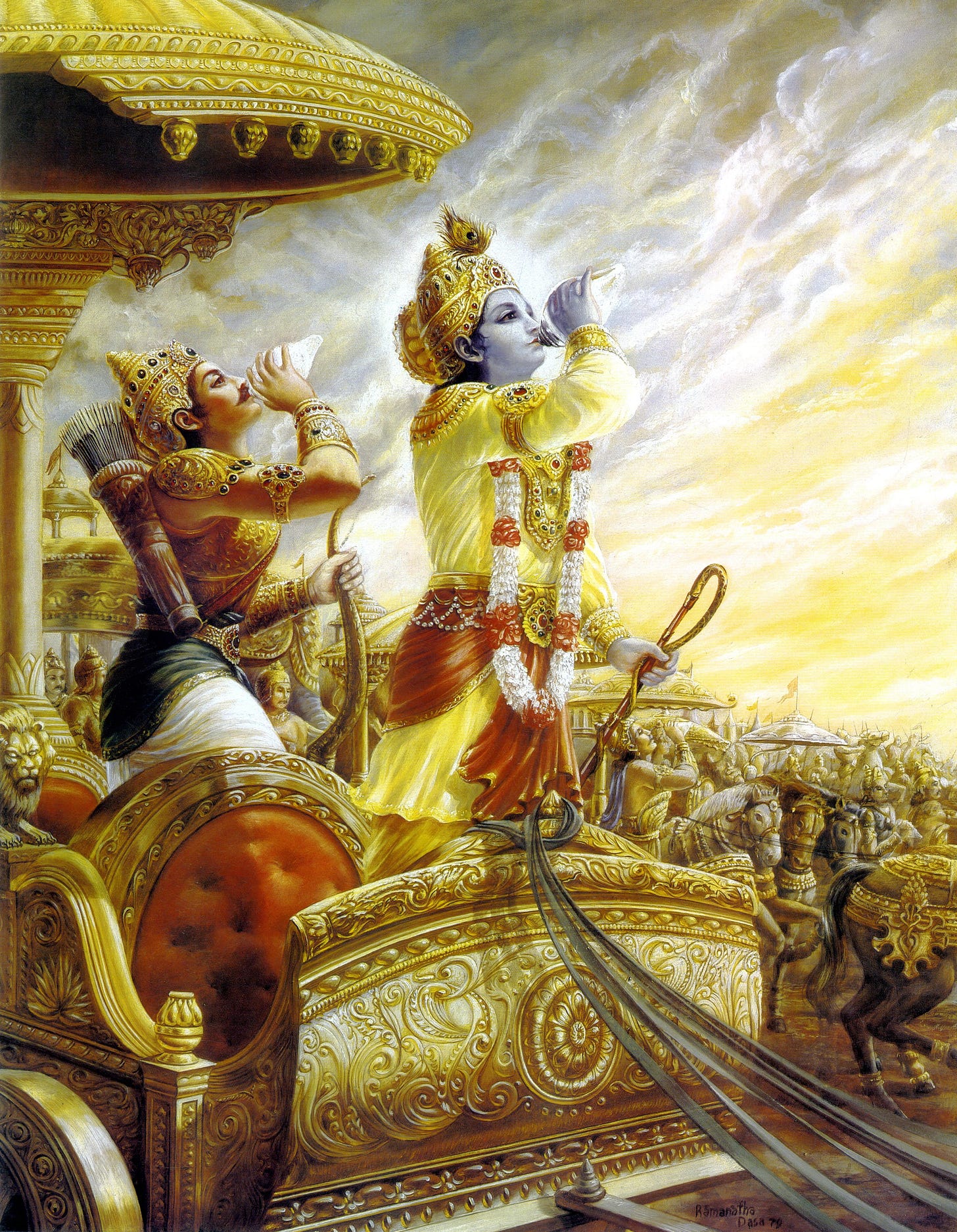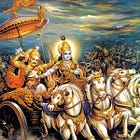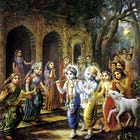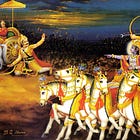The treasure in the first chapters of the Gītā
Among all books from Srila Prabhupada, the first chapters of the Bhagavad-Gita are especially important. Although they don't contain any esoteric details, they deal with practical problems we face.
Among all books from Srila Prabhupada, the first chapters of the Bhagavad-Gita are especially important. Although they don't contain any esoteric details about Rasa or similar topics, they deal with practical problems that we frequently face. Not only are they especially relevant for us, who are still struggling with material desires and trying to balance Krsna Consciousness with other aspects of our personal lives, but they are also especially important when we are presenting Krsna Consciousness to other people. Problems such as fear, lamentation, depression, lack of attention, and so on affect most people nowadays, and these are precisely the problems the first chapters of the Bhagavad-gita help us to deal with.
We often have the idea that Srila Prabhupada's books are only for distribution. We try to give them to everyone, but we don't really study them. Although we are technically part of Prabhupada's movement, we often fail to take advantage of what our movement really has to offer, and thus we suffer from fairly basic problems that could be better understood and even solved with just a basic understanding of the philosophy explained in the Bhagavad-Gita and other books.
For example, how can we overcome fear?
Arjuna also experienced fear at the beginning of the battle of Kurukṣetra. That was one of the reasons he was refusing to fight. Krsna went directly to the source of the problem, explaining that such fear was coming from falsely identifying with the body.
"That which pervades the entire body you should know to be indestructible. No one is able to destroy that imperishable soul. The material body of the indestructible, immeasurable and eternal living entity is sure to come to an end; therefore, fight, O descendant of Bharata. Neither he who thinks the living entity the slayer nor he who thinks it slain is in knowledge, for the self slays not nor is slain." (BG 2.17-19)
Once we can really understand this point of the difference between the body and the soul, better understanding our eternal nature, fear becomes something much easier to manage.
Another problem is apathy. Sometimes we just don't have the will to do things, even if we understand what needs to be done. Sometimes we may also lose our determination due to reverses. Arjuna also experienced this. How could he surpass it?
"Those who are on this path are resolute in purpose, and their aim is one. O beloved child of the Kurus, the intelligence of those who are irresolute is many-branched." (BG 2.41)
We need focus in order to achieve goals; the problem is that usually, we are distracted by so many different things. That's the trap of modern society: we are constantly interrupted by messages, notifications, calls, apps, and other distractions, and thus lose the vision of what is really important. Arjuna lost his will to fight at the beginning of the Bhagavad-Gita because he became distracted by the many details of the situation, seeing his family members on the other side of the battlefield, ready to fight him. However, when he became fixed on the instructions of Krsna, his willpower quickly returned. Similarly, when we are capable of reducing the distractions and focusing our mind on our service to Krsna, the same happens.
Arjuna also experienced depression. That's a problem we may also face in many stages of our lives. How to solve it?
Arjuna says on 2.8: "I can find no means to drive away this grief which is drying up my senses. I will not be able to dispel it even if I win a prosperous, unrivaled kingdom on earth with sovereignty like the demigods in heaven."
How does Krsna answer?
"The Supreme Personality of Godhead said: While speaking learned words, you are mourning for what is not worthy of grief. Those who are wise lament neither for the living nor for the dead. Never was there a time when I did not exist, nor you, nor all these kings; nor in the future shall any of us cease to be. As the embodied soul continuously passes, in this body, from boyhood to youth to old age, the soul similarly passes into another body at death. A sober person is not bewildered by such a change. O son of Kuntī, the nonpermanent appearance of happiness and distress, and their disappearance in due course, are like the appearance and disappearance of winter and summer seasons. They arise from sense perception, O scion of Bharata, and one must learn to tolerate them without being disturbed." (Bg 2.11-14)
Just as fear, depression comes from lamentation connected with an incorrect identification with the body. When this identification is removed, both problems are solved. At this point, we can apply what Krsna mentions in 2.38:
"Do thou fight for the sake of fighting, without considering happiness or distress, loss or gain, victory or defeat – and by so doing you shall never incur sin."
When we are capable of acting without attachment, focusing simply on our duty ahead of us, in doing the right thing, everything becomes much easier.
We can see that even the first verses of the Bhagavad-Gita contain solutions for many practical problems we face in life. If we can go deep into the meaning of these verses, and many other verses in the Gita and Srimad Bhagavatam, we can surely avoid many traps.
If you read this article to the end, give it a like or write a commentary. This makes Substack recommend it to more people.
Read also:






Hare Krishna Prabhu ji 🙏 nicely explained and give practical aspects of reading bhagvad gita daily. Thank you prabhu ji